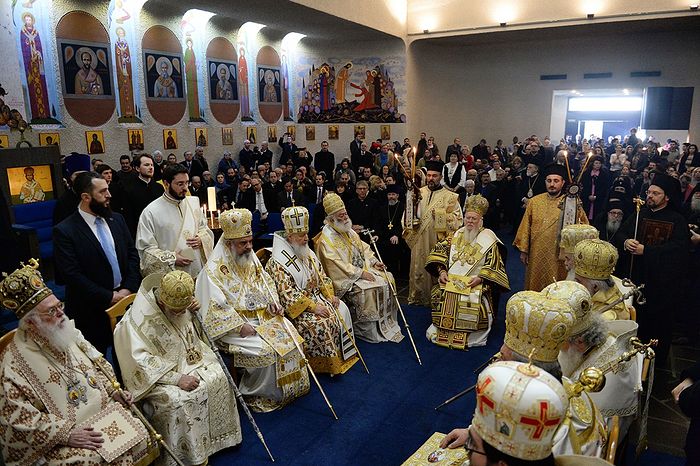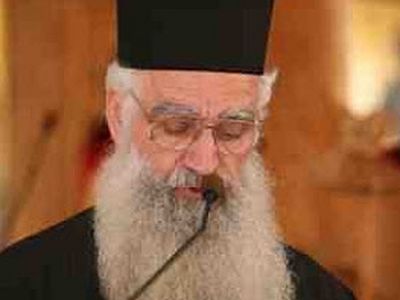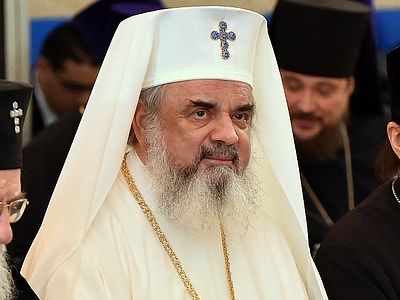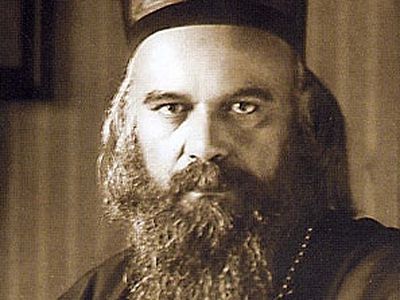Source: DECR Communication Service
January 28, 2016

Draft document of the Pan-Orthodox Council, adopted by the 5th Pan-Orthodox Pre-Council Conference in Chambésy on October, 10-17, 2015.
Published in compliance with the decision of the Synaxis of Primates of the Local Orthodox Churches, Chambésy, January, 21-28, 2016.
- The Orthodox Church, being the One, Holy Catholic and Apostolic Church, in her profound ecclesiastical consciousness firmly believes that she occupies a central place in matters relating to the promotion of Christian unity within the contemporary world.
- The Orthodox Church grounds her unity on the fact that she was founded by Our Lord Jesus Christ, as well as on the communion in the Holy Trinity and in the Sacraments. This unity is manifested through apostolic succession and the patristic Tradition and to this day is lived within her. It is the mission and duty of the Orthodox Church to transmit and proclaim the truth, in all its fullness, contained in the Holy Scripture and the Holy Tradition, the truth which gives to the Church her catholic character.
- The responsibility of the Orthodox Church and her ecumenical mission with regard to the unity were expressed by the Ecumenical Councils. These, in particular, stressed the indissoluble link existing between true faith and the sacramental communion.
- The Orthodox Church, which unceasingly prays “for the union of all,” has always promoted dialogue with those separated from her, both far and near, playing a leading role in seeking ways and means to restore the unity of believers in Christ, participating in the ecumenical movement since its inception, and contributing to its formation and further development. In addition, the Orthodox Church, due to the ecumenical spirit and love for mankind by which she is distinguished and in accordance with the divine dispensation to “have all men to be saved and to come unto the knowledge of the truth” (1 Tim 2:4), has always fought for the restoration of Christian unity. Therefore, the Orthodox participation in the movement for the restoration of Christian unity does not run counter to the nature and history of the Orthodox Church. It is the consistent expression of the apostolic faith and Tradition in a new historical context.
- The bilateral theological dialogues that the Orthodox Church conducts today, as well as her participation in the movement for the restoration of Christian unity, are grounded in her Orthodox consciousness and the spirit of ecumenicity, and are aimed at seeking the lost Christian unity on the basis of the faith and tradition of the ancient Church of the Seven Ecumenical Councils.
- The unity by which the Church is distinguished in her ontological nature is impossible to shatter. The Orthodox Church acknowledges the existence in history of other Christian Churches and confessions which are not in communion with her, and at the same time believes that her relationships with them should be based on a speedy and more accurate elucidation by them of all ecclesiological topics, especially the teaching on Sacraments, grace, priesthood, and apostolic succession as a whole. Accordingly, for theological and pastoral reasons, she has been favorably disposed to dialogue with various Christian Churches and confessions, and to participation in the present-day ecumenical movement in general, in the belief that she thus bears her active witness to the plenitude of Christ’s truth and her spiritual treasures before those who are external to her, and pursuing an objective goal – to tread the path to unity.
- It is in this spirit that today all the Holy Local Orthodox Churches take an active part in official theological dialogues, and most of them participate in the work of various national, regional and international inter-Christian organizations, despite a serious crisis in the ecumenical movement. Such manifold activities of the Orthodox Church derive from the sense of responsibility and from the conviction that mutual understanding, cooperation and common efforts towards Christian unity are of fundamental importance, so as not to “hinder the gospel of Christ” (1 Cor 9:12).
- While conducting dialogue with other Christians, the Orthodox Church by no means underestimates the difficulties arising from it, but is aware of the obstacles lying on the path to a common understanding of the tradition of the ancient Church. It is her hope that the Holy Spirit Who “welds together the whole institution of the Church” (Stichera at Vespers of Pentecost) “will heal what is infirm” (a prayer during ordination). In this regard, the Orthodox Church, in her relations with the rest of the Christian world, relies not only on the human efforts of those involved in the dialogue, but, by the grace of God who prayed “that… all may be one” (Jn 17:21), first and foremost, on the help of the Holy Spirit.
- The participation in the current bilateral theological dialogues announced at the Pan-Orthodox Conferences is the result of a unanimous decision of all Holy Local Orthodox Churches whose duty is to always take an active and lasting part in their work so as not to interfere in the unanimous witness of Orthodoxy to the glory of the Triune God. In the event that a certain Local Church resolves not to send her representatives to a dialogue or its session, the dialogue continues, provided that this decision is not Pan-Orthodox. Prior to the dialogue or its session, an Orthodox commission must discuss the absence of the Local Church, thus expressing the solidarity and unity of the Orthodox Church.
- The problems arising during theological discussions within joint theological commissions are not always sufficient grounds for a Local Orthodox Church’s unilateral recall of its representatives and withdrawal from dialogue. As a rule, it is necessary to avoid a Church’s withdrawal from dialogue and to make the necessary efforts on the inter-Orthodox level to ensure that the Orthodox theological commission participating in the dialogue is fully represented. Should one or more Orthodox Churches refuse to take part in the sessions of the joint theological commission of a certain dialogue for serious ecclesiological, canonical, pastoral and moral reasons, this Church, or these Churches, shall notify the Ecumenical Patriarch and all the Orthodox Churches in written form of their refusal, in compliance with pan-Orthodox practice. In the course of a subsequent pan-Orthodox discussion, the Ecumenical Patriarch shall seek a consensus of the Orthodox Churches as to what actions to follow, including the possibility of reevaluating the progress of that theological dialogue, should it be unanimously found necessary.
- The methodology of conducting theological dialogues is aimed at overcoming traditional theological differences or at revealing possible new disagreements and seeking the common ground of the Christian faith. These methods imply that the entire Church is kept informed of the dialogue’s progress. In the event that it is impossible to overcome some theological difference, the theological dialogue may continue, while the discovered difference shall be recorded and brought to the notice of all the Local Orthodox Churches for further necessary action.
- It is evident that the goal of all theological dialogues is the complete restoration of unity in true faith and love. However, the existing theological and ecclesiological differences make it possible to reveal a certain hierarchy of difficulties lying on the path towards attaining the objectives set at the pan-Orthodox level. The specificity of the problems of any bilateral dialogue points to the differentiation of applied methods, but not of goals, for all dialogues pursue one common goal.
- If necessary, efforts should be made to coordinate the work of different inter-Orthodox theological commissions, considering that the indissoluble ontological unity of the Orthodox Church is to be revealed and manifested in this sphere as well.
- Any officially declared dialogue ends with the completion of the relevant work of the Joint Theological Commission when the chairman of the Inter-Orthodox Commission submits a report to the Ecumenical Patriarch, who, with the consent of the primates of the Local Orthodox Churches announces the end of the dialogue. No dialogue is considered complete until the moment when a decision on its completion is announced on the pan-Orthodox level.
- Upon the successful conclusion of a theological dialogue, a decision, based on the consensus of all Local Orthodox Churches, shall be made on the pan-Orthodox level, concerning the restoration of ecclesiastical communion.
- One of the principal bodies in the history of the ecumenical movement is the World Council of Churches (WCC). Some of the Orthodox Churches were among the Council’s founding members, and later on all the Local Orthodox Churches became its members. As a structured inter-Christian body, the WCC, along with other inter-Christian organizations and regional bodies, such as the Conference of European Churches (CEC) and the Middle East Council of Churches, despite the fact that they do not include all Christian Churches and confessions, carry out an important mission, promoting the unity of the Christian world. The Georgian and Bulgarian Orthodox Churches withdrew membership from the WCC: the former in 1997, and the latter in 1998. They have their own particular opinion on the work of the World Council of Churches and, hence, do not participate in the dialogues conducted by the WCC and other inter-Christian organizations.
- The Local Orthodox Churches which are members of the WCC participate fully and equally in the structure of the World Council of Churches and with all the means at their disposal, contribute to the witness of truth and promotion of unity of Christians. The Orthodox Church hailed the WCC’s decision to respond to her request concerning the establishment of the Special Commission on Orthodox Participation in the WCC, which was done in fulfillment of the mandate of the Inter-Orthodox Conference held in Thessaloniki in 1998. The Special Commission laid down the criteria proposed by the Orthodox and adopted by the WCC, which led to the establishment of the Permanent Commission for Consensus and Cooperation. The criteria were approved and included in the WCC Constitution and Rules.
- Faithful to her ecclesiology, to the identity of her internal structure and to the teaching of the ancient Church of the Seven Ecumenical Councils, the Orthodox Church, while organizationally participating in the WCC, does not accept the idea of the “equality of confessions” and cannot accept Church unity as an inter-confessional compromise. In this spirit, the unity which is sought within the WCC cannot simply be the product of theological agreements alone; it must also be the fruit of a unified faith, sacramentally preserved and lived in the Orthodox Church.
- The Orthodox member Churches of the WCC consider sine qua non for their participation in the WCC the key article of its Constitution which states that only those Churches and confessions that acknowledge Jesus Christ as God and Savior, according to the Scriptures, and believe in God glorified in the Trinity, the Father, the Son, and the Holy Spirit, according to the Nicean-Constantinopolitan Creed, may become WCC members. It is their firm conviction that the ecclesiological presuppositions of the 1950 Toronto Statement on the Church, the Churches and the World Council of Churches, are of paramount importance for Orthodox participation in the Council. It is therefore clear that the WCC is not and by no means can be a “super-Church.” “The purpose of the World Council of Churches is not to negotiate unions between Churches, which can only be done by the Churches themselves acting on their own initiative, but to bring the Churches into living contact with each other and to promote the study and discussion of the issues of Church unity” (Toronto Statement, § 2).
- The prospects for conducting theological dialogues between the Orthodox Church and other Christian Churches and confessions shall always be derived from the canonical criteria of established Church Tradition (canon 7 of the Second Ecumenical Council and canon 95 of the Quinisext Ecumenical Council).
- The Orthodox Church wishes to support the work of the Commission for Faith and Church Order and with particular interest follows its theological contribution to this day. On the whole, the Church has a favorable view of the theological documents adopted by the Commission with the participation of and valuable contribution from Orthodox theologians, regarding the adoption of those documents as an important step towards the rapprochement of Christians. However, the Orthodox Church does not express full agreement with the interpretation of fundamental issues of faith and order made in these documents.
- The Orthodox Church believes that any attempts to shatter Church unity, undertaken by individuals or groups under the pretense of preserving or defending true Orthodoxy, must be condemned. As evidenced by the whole life of the Orthodox Church, the preservation of the true Orthodox faith is only possible thanks to the conciliar structure which since ancient times has been for the Church the strong and final criterion in matters of faith.
- Common to the Orthodox Church is the awareness of the necessity for conducting inter-Christian theological dialogue and therefore believes that dialogue should always be accompanied by witness to the world through the acts of mutual understanding and love, which reflect the joy unspeakable of the Glad Tidings (1 Pt 1:8), excluding any practice of proselytism or any outrageous manifestations of inter-confessional antagonism. In the same way, the Orthodox Church deems it important that we all, Christians, inspired by common fundamental principles of our faith, make efforts to willingly give a unanimous response to those difficult problems posed to us by the contemporary world. This response is to be grounded in the ideal model of a new man in Christ.
- The Orthodox Church is aware of the fact that the movement for the restoration of Christian unity takes new forms in response to new circumstances and new challenges. It is necessary that the Orthodox Church continues to bear her witness to the divided Christian world on the basis of the apostolic Tradition and her faith.
We pray that all Christians work together in order to bring nearer the day in which the Lord will fulfill the hope of the Orthodox Churches, and there shall be one fold, and one shepherd (Jn 10:16).
Chambésy, October 15, 2015




